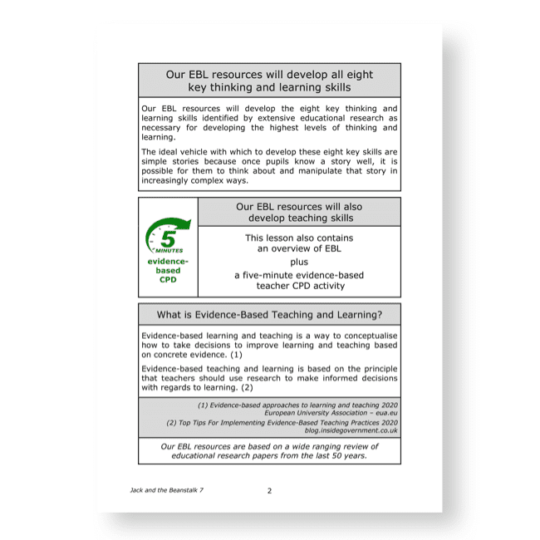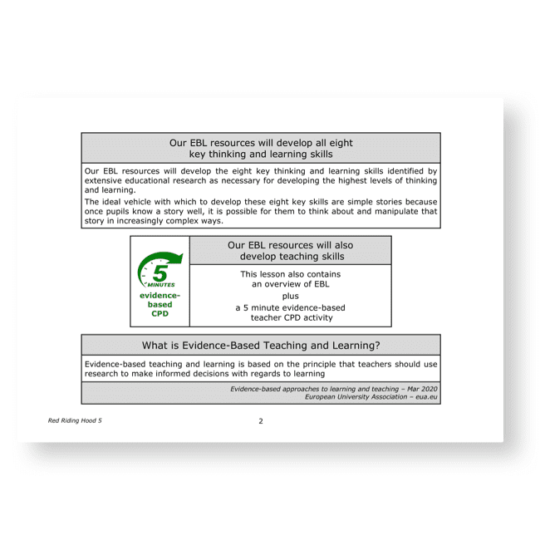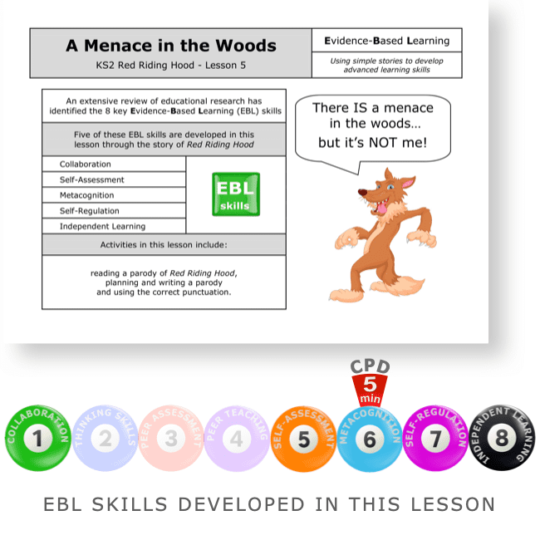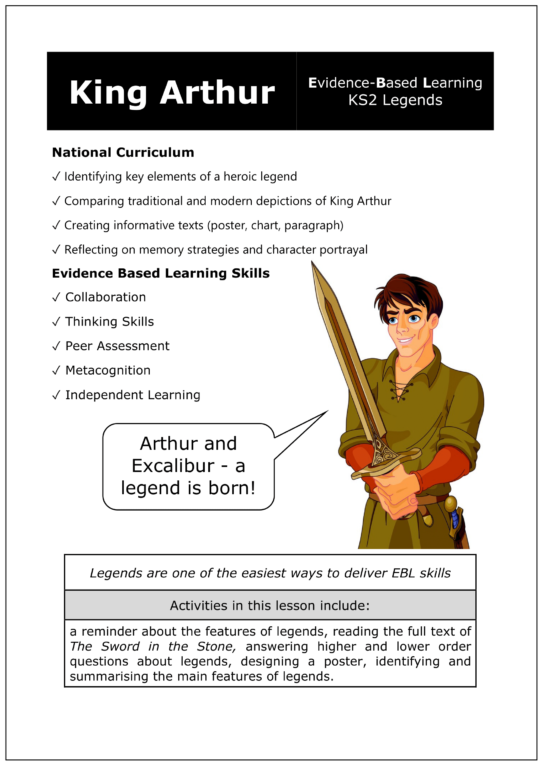Y6 The Emperor’s New Clothes (II) Idioms
£3.00
KS2 National Curriculum:
✓ Exploring the meaning and origin of common idioms
✓ Discussing non-literal language and interpreting figurative phrases
✓ Creating sentences that apply idioms in context
✓ Reflecting on idiomatic meaning through structured dialogue and peer teaching
Activities in this lesson include learning about idioms, looking at how to design a poster and designing a poster to show the main features of idioms.
There is a five-minute evidence-based CPD activity at the end of this lesson which will develop classroom teachers’ skill set. This CPD consists of a research extract on metacognition with a five-minute activity based on this extract.
Description
Recommended Year Group: Year 6
Focus: Figurative language and understanding idioms
Skills Developed:
• Exploring the meaning and origin of common idioms
• Discussing non-literal language and interpreting figurative phrases
• Creating sentences that apply idioms in context
• Reflecting on idiomatic meaning through structured dialogue and peer teaching
• Reading – Vocabulary: Understand figurative language, idioms, and expressions
• Spoken Language: Explain ideas clearly; teach idioms to a peer
• Writing – Composition: Apply idioms in extended writing and short sentence work
• Thinking and Learning: Independent reasoning and peer collaboration
These evidence-based learning (EBL) lessons are based on classroom practice that has been proven, by research, to maximise thinking, learning and attainment. From an extensive review of educational research, we identified the eight key classroom thinking and learning skills that were common across these research papers. We named these eight key skills “EBL skills”.
EBL skills have been proven by research to maximise learning because they combine the most productive thinking skills with the most effective learning behaviours. Each of our evidence-based learning lessons uses the English curriculum as a framework through which the eight EBL skills are delivered.
Teachers also have the opportunity to add to their own skill set or refresh their existing skills with our five-minute CPD activity, based on one of the EBL skills used in this lesson.
The skills in bold below are the EBL skills developed in this Emperor’s New Clothes lesson. Click on each skill to learn more about that skill.
- Collaboration
- Thinking Skills
- Peer Assessment
- Peer Teaching
- Self-Assessment
- Metacognition
- Self-Regulation
- Independent Learning
1 review for Y6 The Emperor’s New Clothes (II) Idioms
Only logged in customers who have purchased this product may leave a review.
Related products
-


Y6 Ground Control to Major Tom
£3.00 Add to basket £3.00Add to basket
£3.00Add to basketKS2 National Curriculum:
✓ Using direct and reported speech; punctuation of speech.
The activities in this lesson include exploring the use of dialogue through the science fiction genre, how to write reported and direct speech using the correct punctuation and completing a true/false task that summarises all the features of reported and direct speech.
There is a five-minute evidence-based CPD activity at the end of this lesson which will develop classroom teachers’ skill set. This CPD consists of a research extract on metacognition with a five-minute activity based on this extract.
VIEW -


First, Pay Attention Jack
£3.00 Add to basket £3.00Add to basket
£3.00Add to basketActivities in this lesson include learning about the difference between rules and instructions, how to write instructions using time connectives, writing brief notes about rules, writing instructions and rules for Jack and a comprehensive true/false task.
There is a five-minute evidence-based CPD activity at the end of this lesson which will develop classroom teachers’ skill set. This CPD consists of a research extract on metacognition with a five-minute activity based on this extract.
VIEW -


A Menace in the Woods
£3.00 Add to basket £3.00Add to basket
£3.00Add to basketActivities in this lesson include reading a parody of Red Riding Hood, planning and writing a parody and using the correct punctuation.
There is a five-minute evidence-based CPD activity at the end of this lesson which will develop classroom teachers’ skill set. This CPD consists of a research extract on metacognition with a five-minute activity based on this extract.
VIEW -


Y6 The Legend of King Arthur
£3.00 Add to basket £3.00Add to basket
£3.00Add to basketKS2 National Curriculum:
✓ Identifying key elements of a heroic legend
✓ Comparing traditional and modern depictions of King Arthur
✓ Creating informative texts (poster, chart, paragraph)
✓ Reflecting on memory strategies and character portrayalActivities in this lesson include a reminder about the features of legends, reading the full text of The Sword in the Stone, answering higher and lower order questions about legends, designing a poster, identifying and summarising the main features of legends.
There is a five-minute evidence-based CPD activity at the end of this lesson which will develop classroom teachers’ skill set. This CPD consists of a research extract on metacognition with a five-minute activity based on this extract.
VIEW






Philipem (verified owner) –
We asked ai. to review this lesson. This is what it said:
Teaching English and Evidence-Based Skills in One Lesson
I recently came across a fantastic Emperor’s New Clothes lesson that manages to teach key English skills like learning idioms and designing posters, while also developing students’ evidence-based learning abilities. This ready-to-use KS2 resource truly has it all.
The English Skills
Over the course of the lesson, students will learn what an idiom is through exploring the idiomatic phrase “the Emperor’s new clothes.” They will look at several common idioms and their historical origins. Students will then work collaboratively to design an informational poster explaining idioms, which develops skills in summarising information, using bullet points, and creating eye-catching displays.
Embedding Evidence-Based Learning
In addition to the English skills, this lesson plan skilfully incorporates research-backed approaches to boost thinking, peer collaboration, peer teaching, metacognition and independent learning. The variety of interactive activities allow students to continually build these evidence-based skills. There are corresponding icons throughout so teachers and students can easily track which skill is being utilised at any given point.
5 Minute CPD Activity
The lesson finishes with a 5 minute CPD extract and activity on metacognition for the teacher to complete themselves. This provides a model of how to reflect on and monitor student progress in developing metacognitive abilities.
Overall this is an engaging and comprehensive resource that teaches both vital English and evidence-based learning skills. I would give it 5 stars! The combination of literacy development and research-driven best practices makes it well worth adding to any primary teacher’s toolkit.